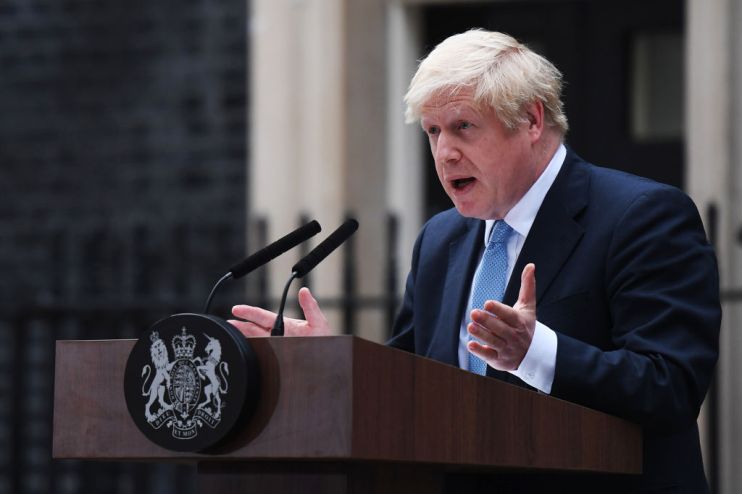Sterling recovers from 34-year low amid Brexit showdown

Sterling crashed below $1.20 this morning to a 34-year low as markets readied themselves for a tumultuous day in Westminster as political chaos hits the Brexit process.
The pound (GBP) dropped as much as 0.83 per cent in early London trading to trade at $1.1961 against the dollar (USD).
Read more: Brexit: PM to call early election if rebel alliance succeeds
“Sterling is under the cosh early doors and it could get worse before it gets better,” warned Markets.com analyst, Neil Wilson.
Rebel Conservative MPs are expected to try to legislate to force Prime Minister Boris Johnson to look for a Brexit extension in mid-October if he is unable to strike a deal with Europe.
Johnson has, in turn, threatened a snap election if their bid succeeds.
Sterling has already taken a hammering in recent weeks amid continued political uncertainty over Brexit.
With a potentially decisive day ahead in parliament, and the prospect of a snap General Election growing ever more likely, it dropped below the $1.20 milestone this morning for the first time in two years.
Sterling had begun to trim its losses by early afternoon, hovering at just above the milestone at $1.2025.
By 4pm GBP was only 0.08 per cent down against USD at $1.2057 as the US economy saw its manufacturing sector shrink.
“Though there is no doubt plenty of pain on the horizon, sterling managed to shake off the excesses of its Tuesday’s slide as the session went on,” Spreadex analyst Connor Campbell said.
“At points striking a sub-$1.20 price last seen in 1985, cable now finds itself down just 0.1%, aided by an apparent reduction in panic-levels and a notably bad ISM manufacturing reading from the US.”
Markets.com’s Wilson said the slight pullback was “not unexpected” as sterling “was maybe a touch oversold on a short term basis”.
“Sterling is set for more volatility over the near term, as the pound remains highly sensitive to the slightest development pertaining to Brexit,” warned FXTM market analyst Han Tan.
“Ultimately, any event that’s seen as pushing the UK closer to a no-deal Brexit would be deemed pound-negative.”
If October 2016’s “flash crash” – which was due to an apparent trading error – is disregarded, this morning’s drop was the weakest the pound has been since 1985.
It came after sterling’s value fell lower and lower yesterday as speculation mounted about a possible General Election, prompting the FTSE 100 to rally.
Weak UK manufacturing data prompted yesterday’s plunge in GBP as industry activity fell to a seven-year low.
As sterling’s drop showed no signs of slowing today, CMC Markets’ chief analyst, Michael Hewson, said GBP is caught between a no-deal Brexit and a Labour government if the Tories lose an election.
“The pound has come under pressure once more as the prospect of an October general election comes into view, with some of the weakness also coming from the weekend headlines as to what a potential Labour administration might do to the UK economy if elected in any new poll,” he warned.
Hewson predicted an even greater fall could arrive, saying: “The pound is looking extremely vulnerable at these levels, and if it stays at current levels against the US dollar we’ll see the lowest weekly close since the mid 1980s.”
Boris Johnson: ‘I don’t want an election’
On the steps of Downing Street yesterday evening, Prime Minister Boris Johnson said: “I don’t want an election; you don’t want an election.”
But he vowed he would never personally seek a Brexit extension beyond 31 October.
A senior government source later confirmed Johnson is planning to treat today’s vote, lodged by opposition MPs to take control of the legislative agenda, as an effective confidence vote.
A government motion for a snap General Election will be tabled if rebels are successful in passing a motion to take control of the order paper, which could allow them to pass legislation removing the possibility of a no-deal Brexit.
There would then be a vote tomorrow under the Fixed-Term Parliaments Act, which requires a two-thirds majority, for a General Election.
“Ultimately, the various political permutations will be judged on whether they raise or dilute the chance of a no-deal Brexit, which has been deemed the worst-case scenario for the UK economy,” said Tan.
Read more: Sterling spirals further as Boris Johnson sparks general election speculation
“Should investors get the sense that a no-deal Brexit can be averted, or at least delayed, it would offer relief for Sterling. Any perceived rise in the likelihood of the UK crashing out of the European Union without a deal should send the pound lower.
“All things considered, the pound remains on its slippery slope as investors continue to ditch the currency amidst the seemingly unending Brexit uncertainties.”